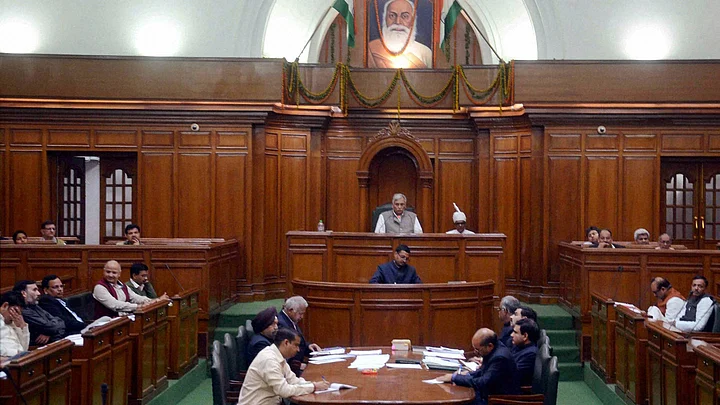The Delhi legislative assembly recently passed a Bill, raising the salaries of MLAs from Rs 12,000 per month to Rs 50,000 per month – a 400% hike. Concurrently, the monthly constituency allowance has been raised from Rs 88,000 to Rs 2 10,000. With this, the Delhi MLA is among the highest paid legislator in the country, barring perhaps Assam.
While Kejriwal and Co. have defended the hike on the ground that ‘reasonable living wages’ should be given to Delhi’s legislators, there has been widespread criticism of the move from not only other political parties, but also from many independent observers.
Not a Good Signal from a Crusader Party
- Justification of a ‘living wage’ sounds hollow,
when the electoral support base of AAP is the ordinary worker in NCR who
struggles for his existence
- In India, becoming an MLA or MP is akin to a
‘business’ proposition – an investment
of 300 crores before elections is likely to yield an income of 1000 to 1500 crores
during a five-year tenure
- One assumes that an average AAP MLA would have
entered the party and joined politics with the spirit of a crusader, for whom
money is not relevant
- One of the key reasons for poor governance in
India can be traced to not having any checks and balances on the political
class
Blow to AAP’s Ideology
Note that Delhi is not even a full-fledged state, it is a Union Territory. Indeed, it is noteworthy that the so-called Delhi Government has even less powers, than say the Brihan Mumbai or Bengaluru Municipal Corporation; law and order and police is not in its purview, as land and transport-related issues.
It is ironical that the Aam Aadmi Party (AAP), which has acquired the right to ‘rule’ Delhi on its plank of no ‘VIP culture’, simplicity, and deep empathy for the common man, should choose to upgrade the position of the Delhi legislator through this route. The prime justification of a ‘living wage’ sounds hollow, when the main political and electoral support base of AAP is the ordinary worker in NCR, who struggles for his existence with a measly income, a fraction of the new emoluments of his legislator!
Flawed Argument of ‘Reasonable Wage’
Another argument trotted out is that a reasonable ‘wage’ is required to eliminate or sharply diminish the temptation to be corrupt. This is fallacious, and has been demonstrated to be untrue in context of the business or bureaucratic sectors. Indeed, in most parts of India, becoming an MLA or MP is a major ‘business’ proposition – the initial investment may be as high as Rs 50 to Rs 100 crore; with a 1 : 4 chance of success, an investment of Rs 300 crore will postulate an income of the order of Rs 1,000 to Rs 1,500 crores during a five-year tenure.
Those who have invested in the prospective legislator, will want exorbitant dividends when his ‘horse’ wins. Hence the phenomenon of mafias flourish in every tehsil, district and state headquarters. AAP has arrived on the promise of ‘clean governance’; this is possible only if the electoral process is transparent – it will be incongruent to argue that the hike of a few thousand rupees in salaries will clean up the political class.
Even the election of a Municipal Councilor in many parts of India costs 10 to 20 crores – the Delhi MLA is the equivalent of a Municipal Councilor. Nothing can be more absurd than arguing that the Delhi MLA should be compensated with an executive’s salary to retain his honesty!
Cause of Public Welfare
Indeed in the first few decades after independence, most legislators came into politics on the plank of genuine public service. During the ‘70s and ‘80s, politics became a business, turning out in this century to be an unprincipled, unregulated black money-oriented commercial venture.
Nobody could quarrel with the proposition that the MLA or MP should have reasonable compensation, to lead a decent life – he should be judged on the basis of his contribution to public welfare. Without specific reference to AAP, this proposition is no more valid. One would assume that an average AAP MLA would have entered the party and joined politics with the spirit of a crusader, for whom money is not of relevance – his motivation is to act as an instrument of change in the system.
The arrangement that a legislator can settle his own terms of service, without outside independent assessment is highly undesirable. Indeed a key reason for poor governance in India, and deterioration in the politics of the country can be traced to not having any checks and balances on the political class.
However, on balance, none can seriously question the ‘wage increase’ given to the Delhi MLA. Time will tell if AAP will become another ‘normal’ national political party, with the pejorative connotation it invokes. Again on balance, the sharp wage increase leaves a bad taste in the mouth; surely it is not the best signal that a crusading party should give to the general public.
(The writer is a former Cabinet Secretary)
(At The Quint, we question everything. Play an active role in shaping our journalism by becoming a member today.)
